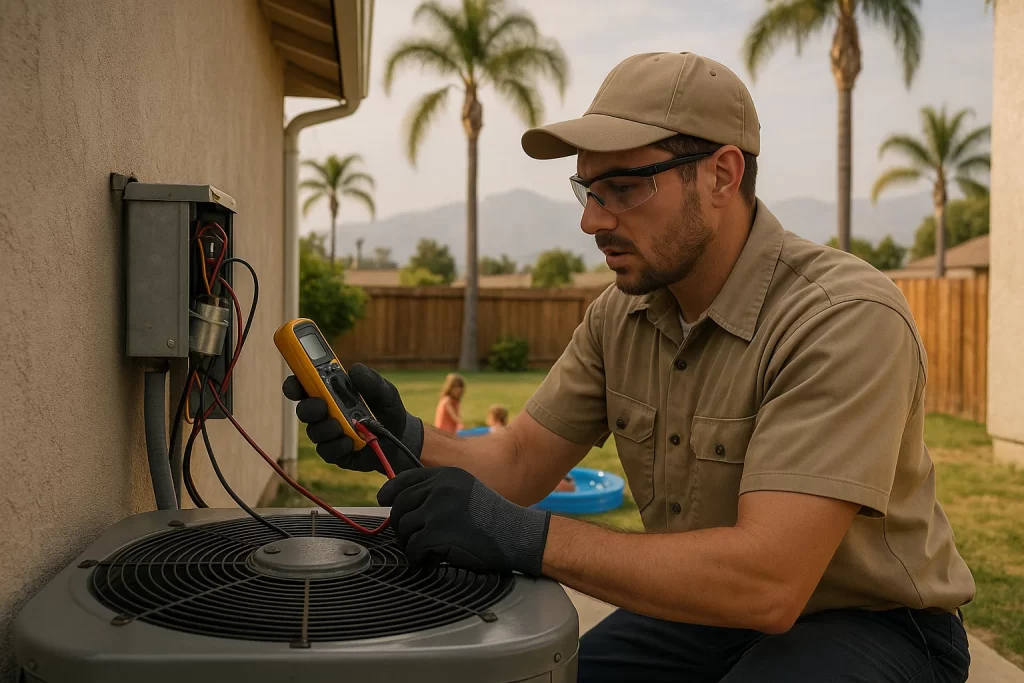It’s a familiar, and frustrating, story for many California homeowners: just as you’re getting ready for the 4th of July weekend, your air conditioner quits. The house is full of guests, the grill is going, and suddenly, the temperature inside starts rising just as fast as the fireworks outside. But why does it always seem to happen on a holiday? And what should you do when it does?
Understanding how to handle an HVAC emergency can save you time, stress, and discomfort, especially during high-demand holiday weekends when repair technicians are booked solid. Here’s what you need to know about what to do during an HVAC emergency and how to keep your cool when the unexpected happens.

Holiday HVAC Breakdowns: Why They Happen
While it may feel like bad luck, there are actually a few good reasons why your AC always seems to fail on a weekend or holiday:
- Increased use – When outdoor temperatures spike during summer holidays, your AC works harder to keep your home cool, especially if you have extra people in the house generating heat.
- Deferred maintenance – If you’ve skipped your seasonal tune-up, minor issues may have gone unnoticed and now manifest as HVAC breakdowns you could’ve avoided under holiday stress.
- Old systems give out – If your system is nearing the end of its lifespan, the added strain of high heat and continuous use can push it over the edge.
- Delayed response times: With fewer technicians on-call during holidays, smaller issues may be left unresolved longer, becoming worse before they’re addressed.
For these reasons, emergency HVAC repair in California often spikes during long summer weekends, especially around July 4th, when temperatures soar and homes are bustling with activity.
HVAC Emergencies: What Qualifies and What Doesn’t
Not all HVAC problems require an urgent response, but certain situations should be treated as emergencies:
- Complete loss of cooling during a heatwave – Prolonged exposure to high indoor temperatures, especially for elderly family members or young children, can be dangerous.
- Unusual burning smells or electrical odors – This could signal overheating components or a fire risk – turn off your system immediately and call for help.
- Unresponsive thermostat or system not powering on – If resetting your breaker doesn’t resolve it, you could have an electrical issue or a failed HVAC component needing attention.
- Refrigerant leaks – If your system is blowing warm air and you suspect a refrigerant issue, don’t delay. Leaks reduce system performance and can damage your compressor.
If your issue falls into one of these categories, it’s best to seek emergency HVAC repair right away – especially during hot California summers.
Emergency HVAC? Do These Steps First
Before picking up the phone, take a few quick steps to rule out simple issues that might save you time and money:
- Check the thermostat – Make sure it’s set to “cool” and that the temperature is set properly. Replace the batteries if it’s battery-powered.
- Inspect your breaker panel: Sometimes, a tripped breaker is all that’s causing your HVAC system to stop running.
- Change your air filter – A clogged filter can restrict airflow and cause the system to overheat or freeze.
- Check the outdoor unit – Make sure the condenser isn’t blocked by debris, leaves, or patio furniture.
- Look for ice or moisture – If your system is iced over, turn it off and let it thaw completely before restarting. This could indicate airflow or refrigerant issues.
Frequently Asked Questions
Question: What counts as an HVAC emergency in California?
Answer: An HVAC emergency is any failure that threatens comfort, health, or safety, such as complete loss of cooling during a heatwave especially with vulnerable people at home, unusual burning or electrical smells, unresponsive system that won’t power on, or suspected refrigerant leaks.
Question: Why do HVAC systems often fail on holidays or busy weekends?
Answer: HVAC systems tend to fail more often on holidays or long weekends because they’re used harder when temperatures spike and homes are full of guests, deferred maintenance issues surface under strain, and fewer technicians are available, delaying fixes.
Question: What should I check before calling for emergency HVAC service?
Answer: Before calling, make sure your thermostat is set correctly, inspect your breaker panel for a tripped breaker, replace a dirty air filter, clear debris from the outdoor unit, and check for ice or moisture that could indicate other issues.
Question: When should I call for emergency HVAC repair instead of waiting?
Answer: You should call immediately if basic fixes don’t work and the issue involves health or safety risks, like extreme indoor heat without cooling, electrical odors, smoke, or significant leaks that could damage your home or harm occupants.
Question: How can regular maintenance reduce emergency HVAC repairs?
Answer: Regular HVAC maintenance helps catch small problems like worn parts, airflow issues, or refrigerant shortages early before they escalate into full system failures during peak demand.
If you’ve tried these steps and your system is still malfunctioning, it’s time to call for professional help.
Contact RKM Heating and Air Conditioning today to schedule an appointment with us for AC maintenance. Done Right, Priced Right.
